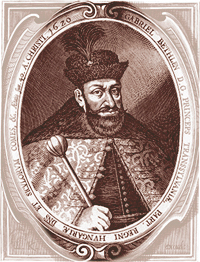 The series of the programs of the Bethlen Memorial Year has been designed to introduce and present the historical role and activities of Gabriel Bethlen to a wider audience, inside and beyond our state borders, with an organised, coordinated and directed cooperation of different disciplines. Our aim is to provide more information and better understanding about Gabriel Bethlen and his age to the public in Hungary and abroad. There are several volumes in English, German and French reflecting the interpretation of the neighbouring countries about Bethlen; however, there are only a few Hungarian-language summaries. The Bethlen Memorial Year may lead to make our national history and a proud and successful image of the Hungarians better known throughout Europe.
The series of the programs of the Bethlen Memorial Year has been designed to introduce and present the historical role and activities of Gabriel Bethlen to a wider audience, inside and beyond our state borders, with an organised, coordinated and directed cooperation of different disciplines. Our aim is to provide more information and better understanding about Gabriel Bethlen and his age to the public in Hungary and abroad. There are several volumes in English, German and French reflecting the interpretation of the neighbouring countries about Bethlen; however, there are only a few Hungarian-language summaries. The Bethlen Memorial Year may lead to make our national history and a proud and successful image of the Hungarians better known throughout Europe.
400 years ago, on 23 October, 1613, Gabriel Bethlen (1580–1629), the most significant Prince of Transylvania ascended the throne. He had to take over a devastated country, empty treasury and desperate politicians due to the ill-considered policy of his immediate predecessor and the damages of the Long Turkish War (1593-1606). The existence of the Principality of Transylvania was restricted by the Turkish protectorate and threatened by the Habsburg Empire. The situation was even worsened by the political and economic crisis affecting all Europe. Gabriel Bethlen was able to get out of this seemingly hopeless situation with recognizing the possibilities lying just in these desperate circumstances. He created a new, effective team of politicians, a court of high European standards, and with brilliant organizing work he could stabilize the political and economic situation in Transylvania. He connected to the European diplomatic and military processes. He generated a powerful military force, and arranged the situation – having been unresolved for more than half a century – of the Székelys forming the main part of the army. His military actions coordinated with his allies were supplemented with his many-folded diplomatic activity. With his peace treaties he was able to enlarge the territory of the Principality of Transylvania, becoming part of the European alliance system with the Treaties of Hague and Westminster. He was elected and ceremonially acclaimed king of Hungary on 25 August 1620, but later he refused to be crowned which made it possible for him to come to an agreement with the Habsburg Monarch and to keep the Ottoman Empire from gaining more influence and from expanding in Transylvania. From then on, Transylvania became the main support for the political and cultural endeavors of Hungarian estates in the Habsburg Empire. The tolerant religious policy of the protestant ruler made Transylvania a host country again. He provided the training of “up-to-date” intellectuals with founding schools and university scholarships. His multifaceted activity served as inspiration for generations from his age on through the centuries.


